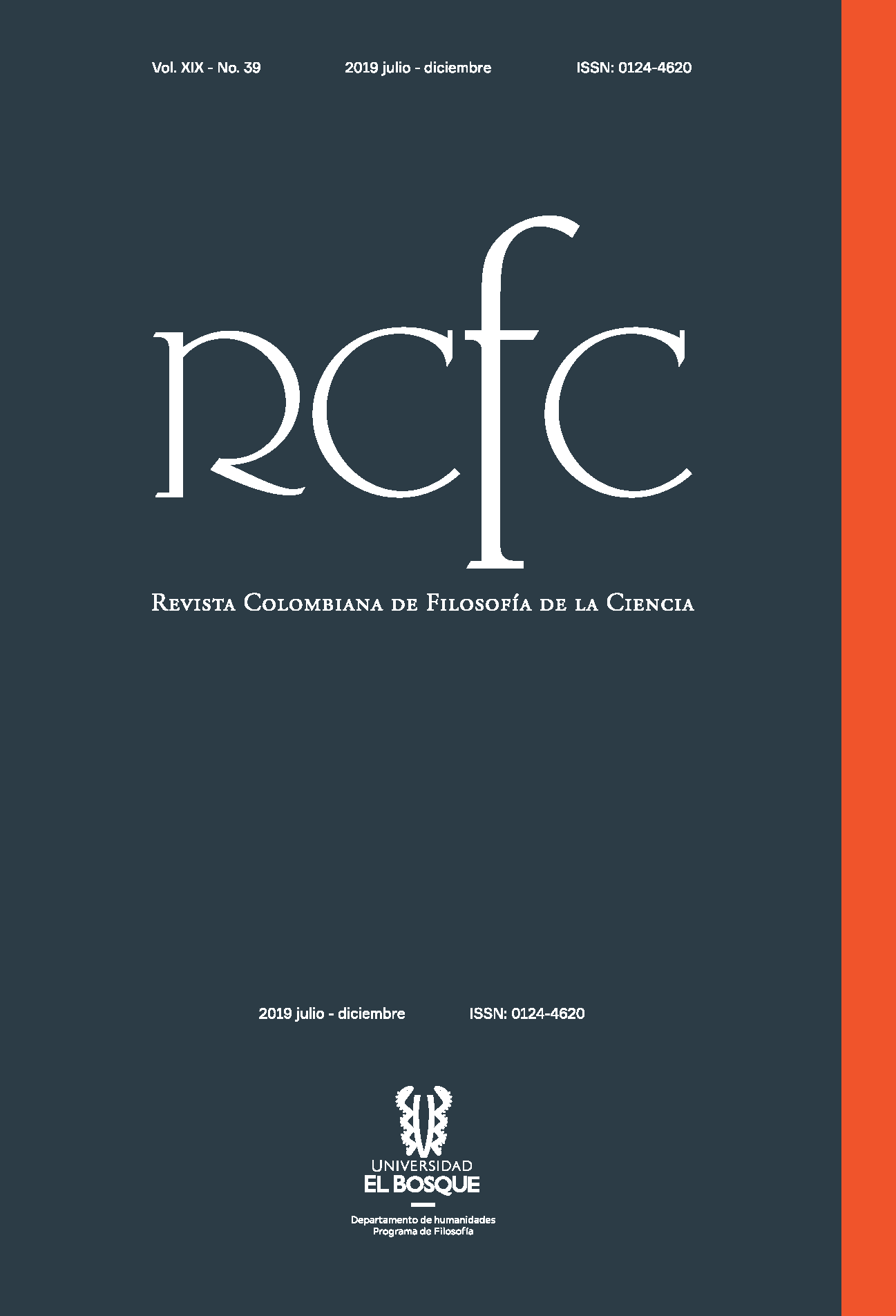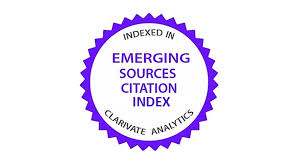Scientific plurality and risk assessment
new arguments in the monism-pluralism debate in Philosophy of Science
DOI:
https://doi.org/10.18270/rcfc.v19i39.2825Keywords:
Epistemology; Scientific Knowledge; Philosophical Controversy; Intervention; EthicsAbstract
Sciences exhibit a multiplicity and plurality of interests, values, languages, methodologies, representations, theories and ontologies. This recognition has given rise to the monism vs. pluralism debate in Philosophy of Science, an arena in which different positions about the negative or positive value of plurality are played out. In general terms, the arguments offered are nourished by metaphysical or epistemological considerations. The main objective of this work is to incorporate ethical arguments into the debate, showing that, in contexts of scientific intervention, how plurality is conceived has a direct impact on our assessment of the risks associated with a given intervention.
Downloads
References
Carnap, Rudolf. The Logical Syntax of Language. 1934. London: Routledge and Kegan Paul, 1937.
Cartwright, Nancy. The Dappled World: Studies of the Boundaries of Science. Cambridge: Cambridge University Press, 1999.
Cat, Jordi. “The Unity of Science”. The Stanford Encyclopedia of Philosophy. <https://plato.stanford.edu/archives/fall2017/entries/scientific-unity/>.
Choe, Hyerun et ál. “The β-chemokine Receptors CCR3 and CCR5 Facilitate Infection by Primary HIV-1 Isolates”. Cell 85.7 (1996): 1135-1148.
Doudna, Jennifer y Emmanuelle Charpentier. “The New Frontier of Genome Engineering with CRISPR-Cas9”. Science 346.6213 (2014): 1258096/1-1258096/9.
Dupré, John. The Disorder of Things: Metaphysical Foundations of the Disunity of Science. Cambridge: Harvard University Press, 1993.
Fehr, Carla. “Explanations of the Evolution of Sex: A Plurality of Local Mechanisms”. Scientific Pluralism Studies in the Philosophy of Science. Eds. Stephen Kellert, Helen Longino y Kenneth Waters. Minneapolis: University of Minnesota Press, 2006. 167-189.
Folguera, Guillermo y Nahuel Pallitto. “Diversidad, pluralismos, reducciones en la biología: análisis de las relaciones entre nociones de gen”. Metatheoria. Revista de Filosofía e Historia de la Ciencia 8.2 (2018): 63-73.
Garfinkel, Alan. Forms of Explanation. New Haven: Yale University Press, 1981.
Giere, Ronald. Scientific Perspectivism. Chicago: The University of Chicago Press, 2006.
Gumer, Jennifer. “The Wisdom of Germline Editing: An Ethical Analysis of the Use of CRISPR-Cas9 to Edit Human Embryos”. The New Bioethics 25.2 (2019): 137-152.
Jinek, Martin et ál. “A Programmable Dual-RNA-guided DNA Endonuclease in Adaptive Bacterial Immunity”. Science 337.6096 (2012): 816-821.
Kaiser, Marie. Reductive Explanation in the Biological Sciences. Dordrecht: Springer, 2015.
Kellert, Stephen, Longino, Helen y Kenneth Waters. Scientific Pluralism, Studies in the Philosophy of Science. Minneapolis: University of Minnesota Press, 2006.
Kitcher, Philip. Science, Truth, and Democracy. Oxford: Oxford University Press, 2001.
Krimsky, Sheldon. “Ten Ways in which He Jiankui Violated Ethics”. Nature Biotechnology 37.1 (2019): 19-20.
Lander, Eric. “The Heroes of CRISPR”. Cell 164.1 (2016): 18-28.
Lederman, Michael et ál. “Biology of CCR5 and Its Role in HIV Infection and Treatment”. JAMA 296.7 (2006): 815-826.
Longino, Helen. The Fate of Knowledge. Princeton: Princeton University Press, 2002.
_____. “Theoretical Pluralism and the Scientific Study of Behavior”. Scientific Pluralism Studies in the Philosophy of Science. Eds. Stephen Kellert, Helen Longino y Kenneth Waters. Minneapolis: University of Minnesota Press, 2006. 102-131.
_____. “Knowledge for What? Monist, Pluralist, Pragmatist Approaches to the Sciences of Behavior”. Philosophy of Behavioral Biology. Boston Studies in Philosophy of Science. Eds. Kathryn Plaisance y Thomas Reydon. Dordrecht: Springer, 2012. 25-40.
_____. Studying Human Behavior: How Scientists Investigate Aggression and Sexuality. Chicago: The University of Chicago Press, 2013.
Ma, Yuanwu, Zhang, Lianfeng y Chuan Qin. “The First Genetically Gene-edited Babies: It’s ‘irresponsible and too early’ ”. Animal Models and Experimental Medicine 2.1 (2019): 1-4.
Mitchell, Sandra. Biological Complexity and Integrative Pluralism. Cambridge: Cambridge University Press, 2003.
Nagel, Ernest. La estructura de la ciencia. 1961. Barcelona: Paidós Surcos, 2006.
Normile, Dennis. “Shock Greets Claim of CRISPR-edited Babies”. Science 362.6418 (2018): 978-979.
Oppenheim, Paul y Hilary Putnam. “The Unity of Science as a Working Hypothesis”. Minnesota Studies on the Philosophy of Science. Vol. II. Eds. Herbert Feigl, Michael Scriven y Maxwell Grover. Minneapolis: University of Minnesota Press, 1958. 3-36.
Pallitto, Nahuel. Representar e intervenir el comportamiento humano. Un análisis desde la filosofía de la biología. Tesis de doctorado 2019. Facultad de Filosofía y Letras, Universidad de Buenos Aires, Argentina.
Richardson, Alan. “The Many Unities of Science: Politics, Semantics and Ontology”. Scientific Pluralism Studies in the Philosophy of Science. Eds. Stephen Kellert, Helen Longino y Kenneth Waters. Minneapolis: University of Minnesota Press, 2006. 1-25.
Rong, Zhili et ál. “Homologous Recombination in Human Embryonic Stem Cells Using CRISPR/Cas9 Nickase and a Long DNA Donor Template”. Protein Cell 5.4 (2014): 258-260.
Ruphy, Stéphanie. “Is the World Really ‘Dappled’? A Response to Cartwright’s Charge against ‘Cross-Wise’ Reduction”. Philosophy of Science 70.1 (2003): 57-67.
_____. “Are Stellar Kinds Natural Kinds? A Challenging Newcomer in the Monism/Pluralism and Realism/Antirealism Debate”. Philosophy of Science 77.5 (2010): 1109-1120.
_____. Scientific Pluralism Reconsidered: A New Approach to the (Dis)Unity of Science. Pittsburgh: University of Pittsburgh Press, 2016.
Sternberg, Samuel y Jennifer Doudna. “Expanding the Biologist’s Toolkit with CRISPR-Cas9”. Molecular Cell 58.4 (2015): 568-574.
Suppes, Patrick. “The Plurality of Science.” PSA 1978: Proceedings of the 1978 Biennial Meeting of the Philosophy of Science Association. Vol. II. Eds. Peter Asquith y Ian Hacking. East Lansing: Philosophy of Science Association, 1978. 3-16.
Zhang, Linqi et ál. “Open Letter from Chinese HIV Professionals on Human Genome Editing”. The Lancet 393.10166 (2018): 26-27.
Downloads
Published
How to Cite
Issue
Section

| Article metrics | |
|---|---|
| Abstract views | |
| Galley vies | |
| PDF Views | |
| HTML views | |
| Other views | |











